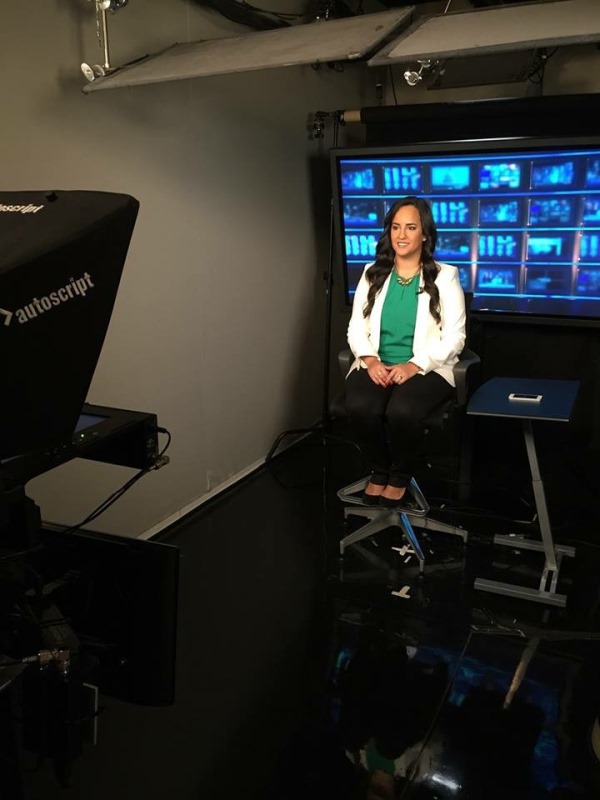13 de August, 2015
I was so honored to be invited to CNN en Español’s show, “Realidades en Contexto,” hosted by Mercedes Soler on Friday, July 31st as their “Woman of the Week”. I had the opportunity talk about the leadership programs I develop and implement at Georgetown University and discuss overall issues in leadership. (Since the interview is in Spanish, I have included a translated transcript, below)
When asked what was the most important trait of a leader, I replied that it’s difficult to identify just one (because we need different types of leadership at different moments), but if I had to pick one of the most important traits, it would be empathy. The ability to relate with others; to be able to understand the other person’s situation; understand what motivates them or what are their concerns; and being able to put myself in their shoes, so that together we can arrive at a solution for whatever challenge we are facing.
It was definitely a rush to speak with limited time about such complex issues, but I hope I was able to spread some awareness about the great work that is being done at Georgetown by the Latin American Board and it’s GCL and ILG Programs as well as the importance of leadership development for our next generation.
Here are some behind the scenes shots!

Waiting in the green room and catching up on tweets!

Ready for showtime!
———
Mercedes Soler: She has focused her work on designing and delivering transformational leadership development programs for Latin American leaders from the public, private and nonprofit sectors including the Innovation and Leadership in Government and Global Competitiveness Leadership Programs.
She has a Certification in Leadership Coaching from Georgetown University, where she currently works as the Associate Director of the Latin American Board, which seeks to increase ties with our region.
We welcome our woman of the week, Diane Garza, who joins us from our studios in Washington, DC. We have been exchanging tweets! Welcome, it’s a pleasure Diane Garza.
Diane Garza: Likewise
Mercedes Soler: Let’s talk about the Global Competitiveness Leadership Program. How many young leaders have you worked with, how do you select them, and in what way to you help them to develop their leadership?
Diane Garza: Yes, thank you for this opportunity. The Global Competitiveness Leadership Program already has more than 320 alumni throughout the region.
These are people that work in all sectors, but more importantly they are having a social impact, a positive impact in their communities.
We look for people that already have a track record as a leader in different areas and we seek people that can bring others together, and also transmit the knowledge they acquire at Georgetown University.
Mercedes Soler: Now, Diane, Let’s talk about what the leadership program offers in the United States that might be more difficult to obtain in our Latin American countries?
Diane Garza: This program focuses not only on the academic component which is fundamental. We have professor from different departments at Georgetown University.
But, something that is also very important is personal development. We focus on the individual, and seek to have an integral program
So, we have activities in which they can learn about themselves through different exams, we have team building activities
And we really try to have them focus on their strengths, and how they can fortify them to become a better leader no matter what sector they are in.
Mercedes Soler: Diane, How do we take this knowledge back home, and how do we interpret this so it can help us grow? In other words, how do you create a leader? Are you born with it? Is it innate? Do you learn it? Can it be taught? Or is it a combination of all of this?
Diane Garza: That is a great question, and there is a lot of discussion around it. I believe there are born leaders and there are also many of us that can obtain leadership skills.
There are many things, such as emotional intelligence for example, which is the base of many other skills… being able to interrelate with others, knowing how to express ourselves and having empathy, and these are all skills that can be obtained, and through practice they can be strengthened.
Mercedes Soler: What is most important for a leader? What tells the rest of us “that’s a person I want to follow?”
Diane Garza: It’s difficult to mention just one quality that defines a leader, but I believe empathy is very important.
It’s that ability to relate with others, to be able to understand the other person’s situation, understanding what motivates the other or what are their concerns, and being able to put myself in their shoes, so that together we can arrive at a solution for whatever challenge we are facing.
So, I think that empathy in order to understand others is extremely important.
Mercedes Soler: Very good, and we know lots of good leaders and sometimes one has the empathy but it is difficult to manage others, it’s difficult to become a friend no matter how much empathy. And that’s the difference as well; sometimes it’s not the friend or brother that becomes a leader.
Diane Garza, it’s been a pleasure and congratulations!
Diane Garza: Thank you very much for the opportunity!
¿Te resulto informativo? Síguenos en @icatalyze para más contenido como este.

In today’s business landscape, where automation and digitalization are on the rise, human skills have become more valuable than ever. Emotional intelligence (EI) not only improves individual performance but is also a key driver for organizational productivity and profitability. According to Capgemini, developing EI in the workplace not only improves communication but also drives decision-making […]
Ver más »
This article was previously published in Spanish for Entrepreneur En Español. (Read original version here) According to one study, 90% of high-performing employees possess high emotional intelligence (EI), underscoring its importance in effective leadership. As the year draws to a close, leaders have an invaluable opportunity to reflect on their journey and assess their impact. […]
Ver más »
Technological advances are reshaping how we live and work in a world increasingly dominated by Artificial Intelligence (AI) and automation. According to the World Economic Forum, 50% of workers will need to acquire new skills by 2025 due to the impact of emerging technologies. Yet, amidst this digital revolution, a crucial question arises: […]
Ver más »